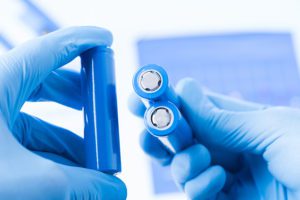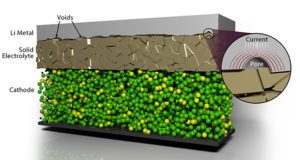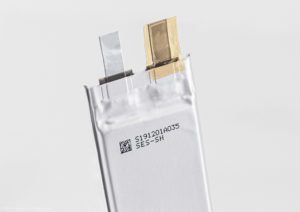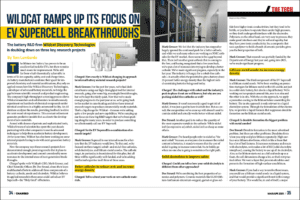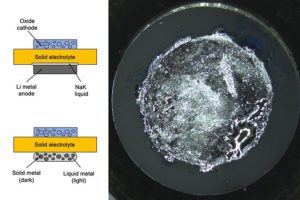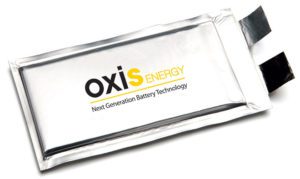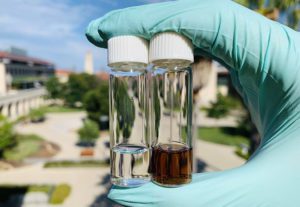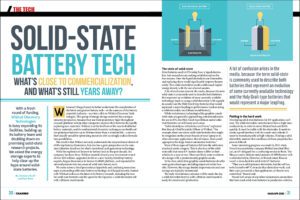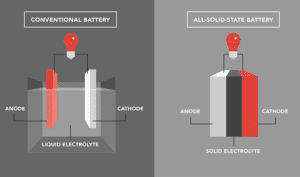California battery developer Sepion has received $16 million from investors, including international chemical firm Solvay. Sepion plans to use the funds to speed up the commercialization of lithium metal batteries for EVs. Solvay offers additives for the electrolytes in Li-ion cells. Sepion’s niche is lithium metal battery cells, which Solvay says feature high energy density… Read more »
Search Results Found For: "dendrites"
ORNL scientists use electrochemical pulse to overcome contact impedance
Scientists at Oak Ridge National Laboratory have developed a scalable, low-cost method to improve the joining of materials in solid-state batteries. One of the challenges in manufacturing solid-state batteries is the difficulty of getting materials to properly join and remain stable during repeated cycles of charging and discharging. Scientists studying methods to overcome this contact… Read more »
New SES Li-metal battery reaches 107 Ah
Battery supplier SES has released Apollo, a 107 Ah Li-metal battery for EVs. The company also announced plans for its Shanghai Giga plant, a 300,000-square-foot facility that the company hopes will be capable of producing 1 GWh of batteries annually by 2023. SES has addressed the dendrite safety problem associated with Li-metal batteries by coating… Read more »
Wildcat ramps up its focus on EV Supercell breakthroughs
The lithium-ion battery has proven to be an excellent fuel tank for EVs, but there remains much room for improvement. We’re still far from what’s theoretically achievable in terms of Li-ion capacity, safety, cost and charge times. As battery manufacturers continue their quest for improved chemistry and material combinations, they rely on applied researchers like… Read more »
MIT researchers use semisolid electrode to prevent short circuits in lithium metal batteries
Researchers may have found ways to prevent dendrite formation in solid-state batteries. Their findings are described in the journal Nature Energy, in a paper by MIT graduate student Richard Park, MIT Professor Yet-Ming Chiang and researchers at MIT and other institutions. Chiang explained, “The only way you can reach the energy densities that are interesting… Read more »
Oxis Energy’s ultralight Li-sulfur batteries are aimed at aviation
Oxfordshire-based Oxis Energy has been working on lithium-sulfur battery technology since 2004 (Charged has reported on the company several times over the years). In a recent article in IEEE Spectrum, the company’s Head of Battery Development and Integration, Mark Crittenden, explains why lithium-sulfur tech is uniquely suited to electric aviation. Weight is a critical constraint… Read more »
Researchers develop novel battery electrolyte for lithium metal batteries
A new lithium-based electrolyte invented by Stanford University scientists could pave the way for the next generation of EVs. In a study published in Nature Energy, Stanford researchers demonstrated how their novel electrolyte design boosts the performance of lithium metal batteries. “Most electric cars run on lithium-ion batteries, which are rapidly approaching their theoretical limit… Read more »
Solid-state battery tech: What’s close to commercialization, and what’s still years away?
With a fresh round of funding, Wildcat Discovery Technologies is busy expanding its facilities, building up its battery team and doubling down on promising solid-state research projects. We asked the energy storage experts to help clear up the hype around solid-state batteries. Whenever Charged needs to better understand the complexities of the latest and greatest battery… Read more »
Researchers make Ceramic-based flexible electrolyte sheets for lithium metal batteries
Researchers at Tokyo Metropolitan University have developed a new method to make ceramic-based flexible electrolyte sheets for lithium metal batteries. They combined a garnet-type ceramic, a polymer binder, and an ionic liquid, producing a quasi-solid-state sheet electrolyte. The synthesis is carried out at room temperature, requiring significantly less energy than existing high-temperature (>1,000° C) processes…. Read more »
Samsung researchers describe all-solid-state battery with silver-carbon composite layer
Researchers from the Samsung Advanced Institute of Technology (SAIT) and the Samsung R&D Institute Japan (SRJ) have published a study on high-performance, long-lasting all-solid-state batteries in the journal Nature Energy. Compared to lithium-ion batteries, which employ volatile liquid electrolytes, all-solid-state batteries use non-volatile solid electrolytes that support greater energy density. However, their lithium metal anodes… Read more »




